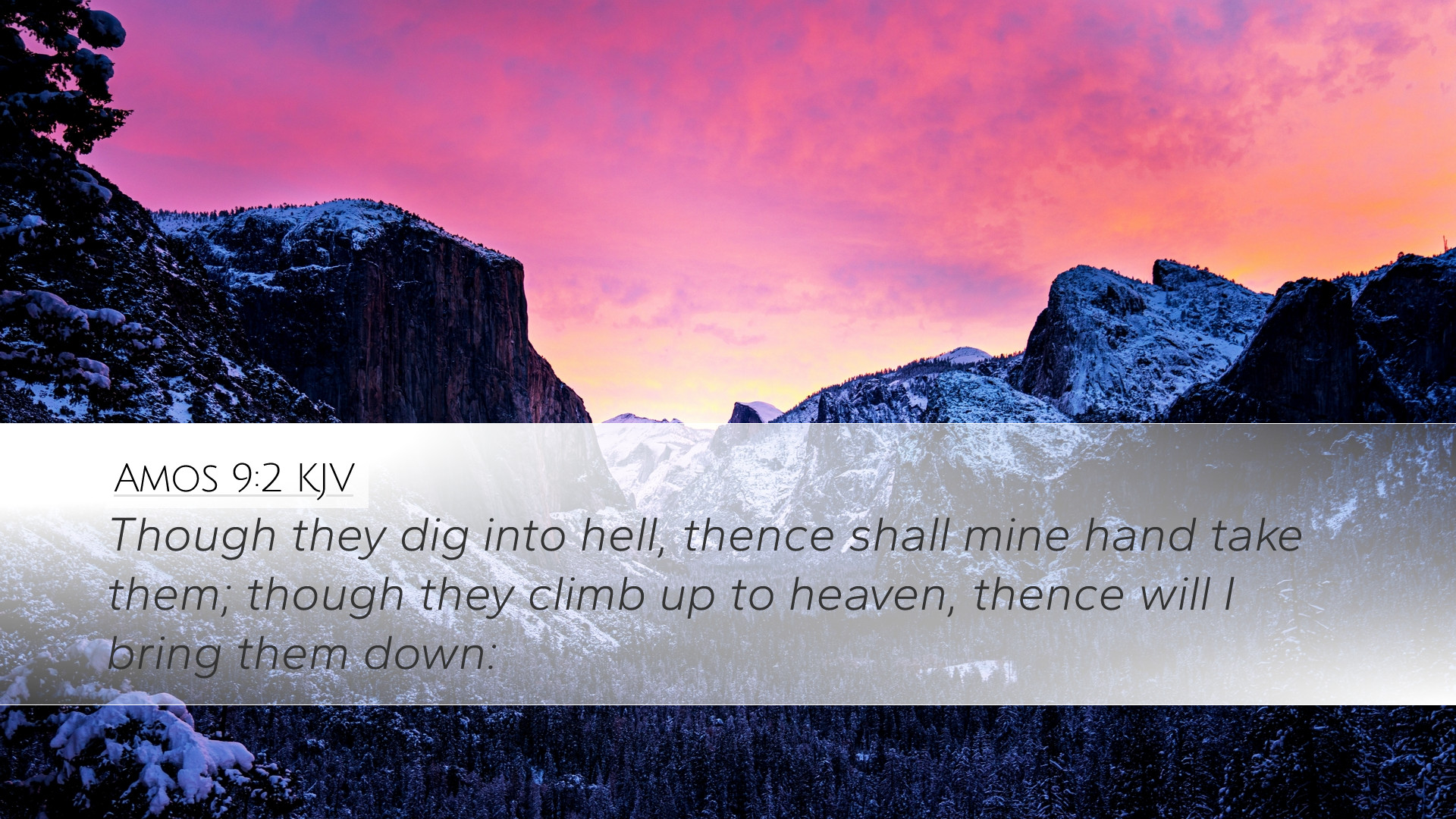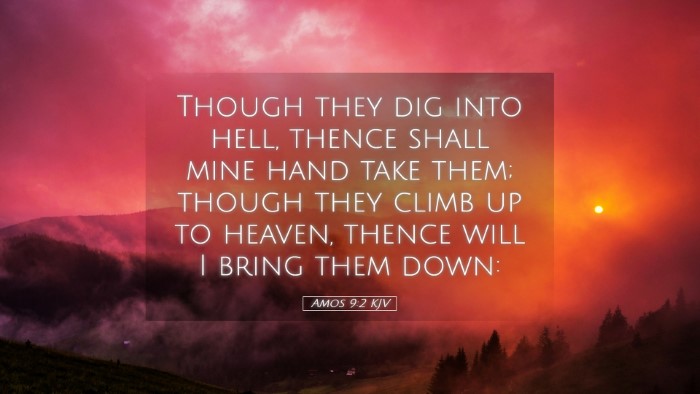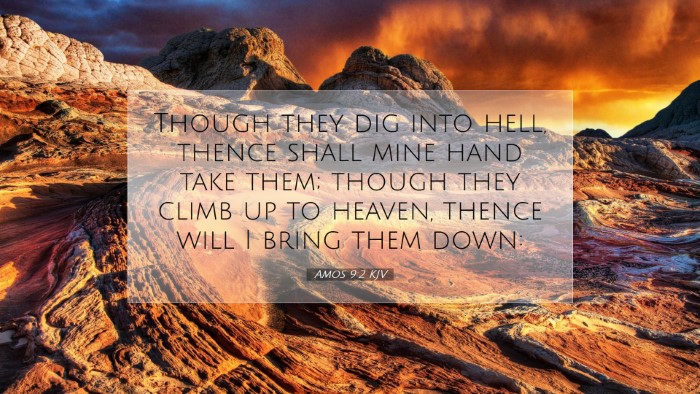Old Testament
Genesis Exodus Leviticus Numbers Deuteronomy Joshua Judges Ruth 1 Samuel 2 Samuel 1 Kings 2 Kings 1 Chronicles 2 Chronicles Ezra Nehemiah Esther Job Psalms Proverbs Ecclesiastes Song of Solomon Isaiah Jeremiah Lamentations Ezekiel Daniel Hosea Joel Amos Obadiah Jonah Micah Nahum Habakkuk Zephaniah Haggai Zechariah MalachiAmos 9:2
Amos 9:2 KJV
Though they dig into hell, thence shall mine hand take them; though they climb up to heaven, thence will I bring them down:
Amos 9:2 Bible Commentary
Commentary on Amos 9:2
Amos 9:2 states: "Though they dig into hell, thence shall my hand take them; though they climb up to heaven, thence will I bring them down."
Contextual Overview
The Book of Amos is a significant prophetic text in the Old Testament that addresses the social injustices and religious corruption of Israel in the 8th century BC. Amos, a shepherd and fig farmer from Tekoa, delivered God's message of impending judgment against Israel, calling for repentance and justice. In the final chapter, Amos emphasizes God's relentless sovereignty and omnipresence, underscoring that no one can escape His judgment.
Exegetical Insights
The verse can be divided into two parts illustrating God's sovereign control over humanity—regardless of their efforts to hide or escape from His gaze.
- “Though they dig into hell…” – This phrase depicts an effort to escape from the judgment of God, suggesting a deep desire to hide one's sins and elude divine scrutiny. Henry highlights that this could refer to the depths of the earth where the dead reside, indicating unique attempts of evasion.
- “...thence shall my hand take them;” – Despite their attempts to hide, God's reach can penetrate even the depths of hell. Clarke notes that this signifies God's omniscience and omnipotence, reaffirming that nothing escapes His awareness.
- “Though they climb up to heaven…” – This implies a misguided reach for divine status or escape. The imagery of climbing metaphorically represents human pride and aspiration.
- “...thence will I bring them down.” – Barnes emphasizes that God's authority is such that He can bring down the haughty and exalted. It is a statement of judgment against those who reside in arrogance.
Theological Implications
This verse conveys profound theological truths about God’s nature and His relationship with humanity.
- Omnipresence of God – God's ability to find individuals in both hell and heaven illustrates His omnipresence. There is no place where one can hide from God's judgment. As Clarke remarks, this serves as a warning against delusional thinking that one may escape God’s scrutiny.
- Human Condition and Pride – The efforts to dig into hell or climb to heaven can be seen as a representation of humanity’s futile attempts to manipulate or transcend their condition. The commentary by Henry indicates that this reflects the sinful heart's rebellion against divine authority.
- Judgment and Accountability – This verse is a powerful reminder of accountability. God’s justice is inescapable—no matter the earthly status or spiritual aspiration of individuals. Barnes states that sinners will have their defiance met with irresistible judgment.
Practical Application
For pastors, theologians, and students, Amos 9:2 invites reflection on several practical considerations:
- Awareness of Divine Judgment – This text serves as a stark reminder of God's judgment. It prompts believers to examine their lives for hidden sins and to foster an attitude of repentance.
- God’s Sovereignty in Challenges – When facing personal trials, one can find comfort in the sovereignty of God. His reach extends even into the darkest places; He is intimately involved in every situation.
- Encouragement for Evangelism – Acknowledging that no one can hide from God compels believers to share the Gospel with urgency. Individuals are unlikely to escape the repercussions of sin without encountering Christ.
- Humility in Approach to God – The imagery of climbing to heaven serves as a caution against pride. In prayer and communion with God, believers are encouraged to approach with humility, recognizing their reliance on His grace.
Conclusion
Amos 9:2 serves as a profound exhortation regarding the nature of God’s judgment and the futility of human efforts to evade divine sovereignty. Insights from public domain commentaries like those of Matthew Henry, Albert Barnes, and Adam Clarke illuminate the depth of this verse, reiterating themes of accountability, human pride, and the enduring presence of God throughout history.
As we contemplate the meaning of this text, may it inspire both reverence for God’s power and a desire for authentic relationship free from the illusion of escape or self-sufficiency.


